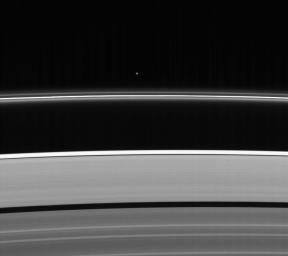
|
The Other Shepherd
- Click the image above for a larger view
- Full-Res JPEG (970 x 862) (46.5 kB)
- Full-Res TIFF (970 x 862) (837.2 kB)
Caption:
Less intrusive than her sibling shepherd moon, Pandora nonetheless provides a gravitational influence that helps confine and perturb the F ring's shape.
See PIA07632 for a high resolution view of Pandora (84 kilometers, or 52 miles across).
Also notable here is the brightness of the region of the outer A ring which lies outside the very narrow Keeler gap.
This view looks toward the unlit side of the rings from about 38 degrees above the ringplane.
The image was taken in visible light with the Cassini spacecraft narrow-angle camera on Oct. 16, 2006 at a distance of approximately 2 million kilometers (1.2 million miles) from Pandora and at a Sun-Pandora-spacecraft, or phase, angle of 157 degrees. Image scale is 12 kilometers (7 miles) per pixel.
Background Info:
The Cassini-Huygens mission is a cooperative project of NASA, the European Space Agency and the Italian Space Agency. The Jet Propulsion Laboratory, a division of the California Institute of Technology in Pasadena, manages the mission for NASA's Science Mission Directorate, Washington, D.C. The Cassini orbiter and its two onboard cameras were designed, developed and assembled at JPL. The imaging operations center is based at the Space Science Institute in Boulder, Colo.
For more information about the Cassini-Huygens mission visit http://saturn.jpl.nasa.gov/home/index.cfm . The Cassini imaging team homepage is at http://ciclops.org .
Cataloging Keywords:
| Name | Value | Additional Values |
|---|---|---|
| Target | Pandora | |
| System | Saturn | |
| Target Type | Satellite | |
| Mission | Cassini-Huygens | |
| Instrument Host | Cassini Orbiter | |
| Host Type | Orbiter | |
| Instrument | Imaging Science Subsystem (ISS) | |
| Detector | Narrow Angle Camera | |
| Extra Keywords | Grayscale, Visual | |
| Acquisition Date | ||
| Release Date | 2006-11-22 | |
| Date in Caption | 2006-10-16 | |
| Image Credit | NASA/JPL/Space Science Institute | |
| Source | photojournal.jpl.nasa.gov/catalog/PIA08315 | |
| Identifier | PIA08315 | |
